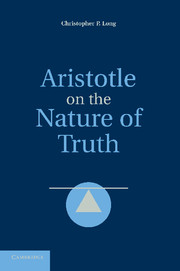Book contents
- Frontmatter
- Contents
- Prolegomenon
- Aristotle on the Nature of Truth
- 1 The Saying of Things
- 2 A History of Truth as Cor-respondence
- 3 Saving the Things Said
- 4 By Way of Address
- 5 By Way of Response
- 6 The Truth of Nature and the Nature of Truth in Aristotle
- 7 On Saying the Beautiful in Light of the Good
- 8 Ecological Justice and the Ethics of Truth
- Works Cited
- Index of Passages Cited
- General Index
- References
3 - Saving the Things Said
Published online by Cambridge University Press: 06 December 2010
- Frontmatter
- Contents
- Prolegomenon
- Aristotle on the Nature of Truth
- 1 The Saying of Things
- 2 A History of Truth as Cor-respondence
- 3 Saving the Things Said
- 4 By Way of Address
- 5 By Way of Response
- 6 The Truth of Nature and the Nature of Truth in Aristotle
- 7 On Saying the Beautiful in Light of the Good
- 8 Ecological Justice and the Ethics of Truth
- Works Cited
- Index of Passages Cited
- General Index
- References
Summary
And it is just to feel gratitude not only to those whose opinions one shares, but even to those whose pronouncements were more superficial, for they too contributed something, since before us they exercised the active condition [ἕξις] of thinking.
Aristotle, MetaphysicsLet us begin again with Aristotle as Aristotle so often begins with us: by attending carefully to the words of the ancients. Xenophanes, who, Aristotle so generously claims, “made nothing clear,” nevertheless gives voice to the hope and tragedy of the human condition: “But from the beginning the gods did not reveal all things to mortals; but by seeking they discover better in time.” Ours is not a world of superlatives but of comparatives – the best, the purest revelation of truth remains concealed to us, and yet in time, indeed by searching, we discover better. Xenophanes emphasizes the temporality of human striving, and one might imagine that this points not merely to the progressive attainment of ever more effective articulations of the truth, but also to the cumulative effect past articulations always already have on present attempts to give voice to the nature of things.
Despite his rather harsh judgment of Xenophanes, Aristotle's own words resonate with his:
Theorizing [θεωρία] concerning the truth is in one sense difficult, in another sense easy. A sign of this is that no one can [τὸ δύνασθαι] obtain it adequately, nor do all fail; but each says something concerning nature [λέγειν τι περὶ τῆς φύσεως], and although one by one each adds little or nothing to it, from all of them being gathered together something great comes into being.
- Type
- Chapter
- Information
- Aristotle on the Nature of Truth , pp. 49 - 71Publisher: Cambridge University PressPrint publication year: 2010



